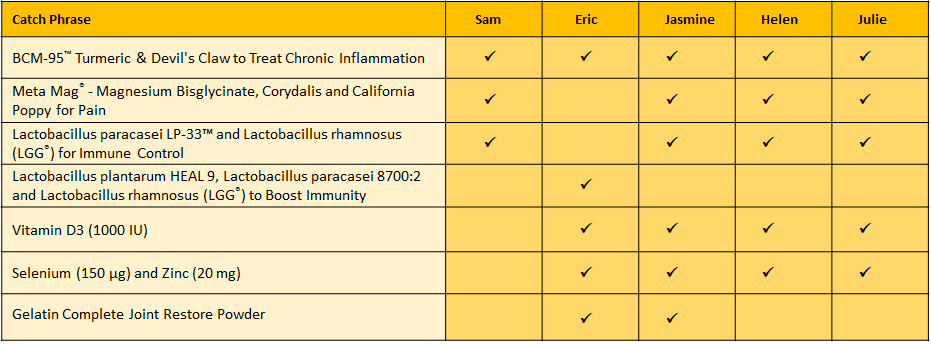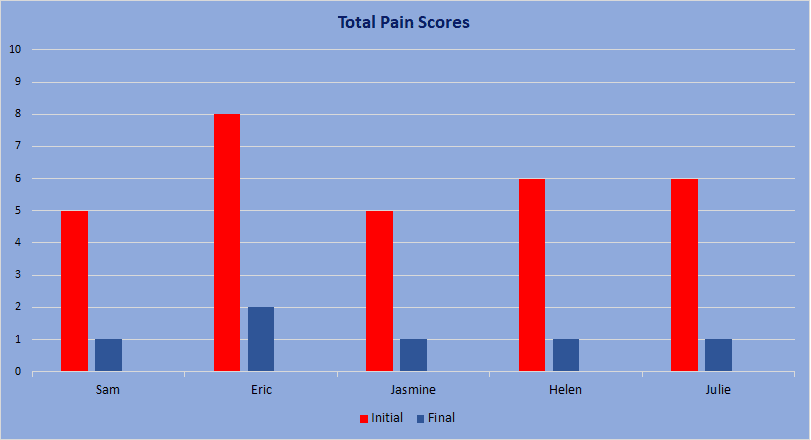Inflammation Damages Lives
Chronic inflammatory conditions are one of the most common presentations that Practitioners see in clinic. Whether it be autoimmune (AI) conditions such as systemic lupus erythematosus and rheumatoid arthritis (RA); degenerative conditions such as osteoarthritis (OA); or injury resulting in chronic pain and inflammation, the pain and discomfort caused by chronic inflammatory conditions can significantly impact a patient’s quality of life, interfering with social activities, sleep efficiency, occupation choices and daily activities that are taken for granted by the wider community.
Recently, Health World conducted a research clinic to successfully demonstrate the effectiveness of natural treatment prescriptions in reducing the pain of chronic inflammatory conditions and dramatically improving the quality of life of these patients.
Treatments for Inflammatory Patients
All patients underwent fortnightly consultations, and received personalised prescriptions that centred on a core anti-inflammatory protocol. Treatment effectiveness was determined by a fortnightly subjective rating of symptoms including: total pain levels, number of pain locations, flexibility, impact on daily tasks and quality of life. The individual patient presentations at baseline are summarised below:
- Sam, 29 year old male: Annular tear, annular bulge, constant neck and back pain. “I am never pain free.”
- Eric, 33 year old male: Psoriatic arthritis, OA, de Quervains syndrome, extremely stiff and sore on rising each morning. Pain in both knees, wrist, right sternoclavicular joint, right shoulder, lower back, one toe and finger.
- Jasmine, 45 year old female: OA in knees and hands. Pain in back, shoulders and hip daily. Pain gets her “down in the head.”
- Helen, 47 year old female: OA, ankylosing spondylitis. Worst pain in neck with pain radiating to shoulders, yet pain in hips and back most days. “This is painful every day.”
- Julie, 52 year old female: RA, OA, Hashimoto’s disease. Daily pain in all major joints.
The individual patient prescriptions are summarised in Table 1.
Table 1: Patient Prescription.

NOTE: In addition to the above prescription, the following patients also received additional supplements based on individual presentation and serum testing. Jasmine received High Purity, Low Reflux, Concentrated Fish Oil, Helen received Glutamine & Boswellia (BosPure® Boswellia) for Intestinal Integrity. Eric, Jasmine, Helen and Julie were also prescribed Astragalus membranaceous (astragalus) 10 g/day, and Hemidesmus indicus (hemidesmus) 5 g/day.
Outcomes from the Research Clinic
All patients reported significant reductions in their total pain scores (see Figure 1) along with improvements in flexibility and mobility by the end of the 12 week treatment period.

Figure 1: Total patient subjective pain score improvements over 12 weeks.
One of the most poignant outcomes during this clinic was Eric’s result. When Eric commenced the clinic he was on a disease-modifying anti-rheumatic drug (DMARD), along with other prescription and OTC medications to help manage his pain. Within four weeks, Eric’s symptoms had improved to such an extent that he ceased his DMARD to begin trying to conceive his second child. He had previously been reluctant to do so, as when he conceived his first child he had also stopped taking his DMARD, which had resulted in an extremely negative health impact including a significant increase in pain. In contrast, during the eight weeks after he stopped his DMARD (whilst participating in the research clinic), he experienced no increase in pain and inflammation – an extremely positive outcome for
Eric considering his previous experience.
Pillars of Regulating Immune Function
Any patient presenting with inflammatory conditions requires anti-inflammatory and pain relief that is both effective and safe to administer long-term. As such, all patients attending the clinic received the key ingredients Curcuma longa (BCM-95™ Turmeric), Boswellia serrata (BosPure® Boswellia) and Harpagophytum procumbens (devil’s claw) to down-regulate inflammatory pathways and reduce pain. Curcumin is well known for addressing multiple points in the inflammatory cascade decreasing inflammatory mediators including phospholipase, lipoxygenase, COX-2, prostaglandins, collagenase and TNF-α,[1],[2] whilst both curcumin and boswellia prevent the activation of the NFkB pathway,[3],[4] a prototypical proinflammatory signalling pathway. The specific form of curcumin prescribed, BCM-95™ Turmeric, not only has mechanistic data to support its effects; it is validated by numerous, powerful clinical trials in inflammatory conditions such as OA, RA and depression – achieving significant results.[5],[6],[7] The addition of devils claw to this combination reduces pain sensations in the brain by increasing GABAergic and opioid activity,[8] whilst also demonstrating anti-inflammatory and analgesic properties.[9]
In patients specifically presenting with autoimmune-mediated pro-inflammatory conditions, treatment also focused on increasing the T regulatory (Tregs) cell activity and number, the critical master regulators that modulate the immune response; to reduce systemic T helper cell response and decrease inflammation. Interestingly both turmeric[10] and boswellia[11] have been shown to positively influence Treg balance, adding further weight to their prescription in immune-mediated inflammatory disorders. Other ingredients with evidence for increasing the activity and/or number of Tregs include vitamin D[12] (particularly if deficient), selenium, zinc,[13] and herbs such as astragalus and hemidesmus.[14],[15]
Probiotics are also a critical therapy for immune modulation, through their interaction with dendritic cells in the gut-associated lymphoid tissue, and subsequent ability to influence immune reactivity. Specific strains such as Lactobacillus paracasei LP-33® and Lactobacillus rhamnosus (LGG®) help moderate an over-active immune response by supporting Treg function, making these strains an essential consideration when treating AI conditions. This combined approach proved to be successful, likely because it provided a holistic approach to controlling and reprogramming the immune system, which is fundamental when treating AI disease.
Big Impacts from a Practitioner Approach
This case series demonstrates how a combination of targeted natural supplements with appropriate dietary intervention can be an effective treatment for the chronic inflammation seen in a wide range of diseases. The collective impact that these protocols had on this group’s quality of life can best be summed up by patient Helen “I can raise my arms above my head. I can do my hair now”. Often it is the daily tasks that are taken for granted that provide the most significant improvement and happiness to a patient’s life.
References
[1] Chainani-Wu N. Safety and anti-inflammatory activity of curcumin: a component of turmeric (Curcuma longa). J Altern Complement Med. 2003;9(1):161-8.
[2] Camacho-Barquero L, et al. Curcumin, a Curcuma longa constituent, acts on MAPK 38 pathway modulating COX-2 and iNOS expression in chronic experimental colitis. International Immunology. 2007;7:333-342.
[3] Plummer SM, et al. Inhibition of cyclooxygenase 2 expression in colon cells by the chemopreventive agent curcumin involves inhibition of NF-kappaB activation via the NIK/IKK signalling complex. Oncogene. 1999;18(44):6013-20.
[4] Syrovets T, et al. Acetyl-boswellic acids inhibit lipopolysaccharide-mediated TNF-alpha induction in monocytes by direct interaction with IkappaB kinases. J Immunol. 2005;174(1):498-506.
[5] Kizhakkedath R. Clinical evaluation of a formulation containing Curcuma longa and Boswellia serrata extracts in the management of knee osteoarthritis. Molecular Medicine Reports. 2013;8:1542-1548.
[6] Chandran B, Goel A. A randomised pilot study to assess the efficacy and safety of curcumin in patients with active rheumatoid arthritis. Phytotherapy Research. 2012;26(11):1719-1725.
[7] Sanmukhani J, et al. Efficacy and safety of curcumin in major depressive disorder: a randomized controlled trial. Phytother Res. 2014 Apr;28(4):579-85.
[8] Uchida S, et al. Antinociceptive effects of St John’s wort, harpogophytum procumbens extract and grape seed proanthocyanidins extract in mice. Biological and Pharmaceutical Bulletin. 2008;31(2):240-245.
[9] Andersen ML. Evaluation of acute and chronic treatments with harpogophytum procumbens on Freund’s adjuvant-induced arthritis in rats. Journal of Ethnopharmacology. 2004;91:325-330.
[10] Park MJ, et al. Curcumin attenuates acute graft-versus-host disease severity via in vivo regulations on Th1, Th17 and regulatory T cells. PLoS ONE. 2013 8(6): e67171
[11] Stürner KH, et al. Boswellic acids reduce Th17 differentiation via blockade of IL-1β-mediated IRAK1 signaling. Eur J Immunol. 2014;44:1200–1212.
[12] Lang PO, Samaras D. Aging adults and seasonal influenza: does the vitamin D status (h)arm the body? Journal of Aging Research. 2012;2012:Article ID 806198.
[13] Maywald M, Rink L. Zinc homeostasis and immunosenescence. Journal of Trace Elements in Medicine and Biology. 2015;29:24–30 .
[14] He YX, et al. Astragalasides from Radix Astragali benefits experimental autoimmune encephalomyelitis in C57BL/6 mice at multiple levels. BMC Complement Altern Med. 2014;14:313-334.
[15] Kainthla R, et al. Effect of Hemidesmus indicus (Anantmool) extract on IgG production and adenosine deaminase activity of human lymphocytes in vitro. Indian Journal of Pharmacology. 2006;38(3):190-193.









